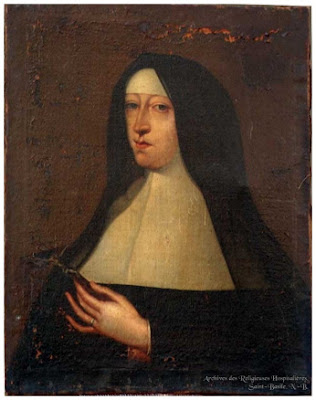
10 Nov Blessed Jeanne Le Royer
Born: 1734, Brittany, France
Died: 1798, Fougères, Brittany, France
Bl. Jeanne, otherwise known as Sr. Marie of the Nativity, was an unusual but distinctive Poor Clare: an extern sister. These sisters forgo the traditional vow of enclosure to serve the community’s needs outside the monastery. Although balancing a fully contemplative life with secular affairs seems a daunting task, it’s possible, as Sr. Marie’s case proved. While serving her community faithfully she thoroughly developed her spiritual life, received messages from heaven, and wrote prolifically on religious topics. During the French Revolution her community was expelled from their monastery at Fougères and forced to take refuge in her brother’s house. This unsettling situation didn’t rock Sr. Marie’s inner peace, and she continued to live out her Poor Clare commitment to Christ as best she could.
She grew indignant over the inequality she often saw between rich and poor. She disliked how the destitute, lacking assistance of those who could give it, died from only slight illnesses, while the rich said, “‘A fever, such and such a malady has caused that poor fellow to die’….[God’s] thunderbolts,” she says, “will fall especially on the avaricious and the rich persons who could have helped the poor, but who instead cast carelessly aside an obligation of charity so much recommended by his Church.” This shows she didn’t find the solution in the dangerous ideologies of the French revolutionaries, but in the solid teaching of the Gospel: “Whatever you did for one of these least brothers of mine, you did for me” (Matthew 25:40).
She delineates the practical standards of interior and exterior poverty (two core values in religious life often viewed in isolation or opposition): “Holy Poverty consist in bearing every day the life of the cross in penance and in privation, in the mortification of the inner and outer senses, in holy subservience, contempt, and self-annihilation with the gaze turned to Jesus Crucified.”
She encourages us to follow the example of a child in the spiritual life, with “his purity, his innocence, his candid little heart, bright with sweetness, serenity, simplicity.” Jesus also told her, “The more you consider yourself unworthy of my favors, the more grateful for them will you be, and I shall pour them out on you all the more abundantly.”
Finally, in a commentary on the Song of Songs, she says, “The noon of [Christ’s] most ardent love is on the cross; here is the noon of the Sun of Justice; hence as he dies for us, he casts on souls the most burning rays of his divine love…. The Crucified is the standard we must follow.”
Bl. Jeanne Le Royer died in her brother’s house in 1798 at age 67.

